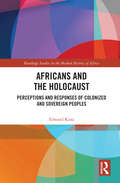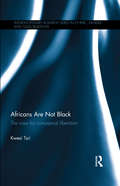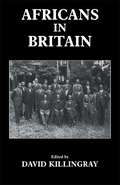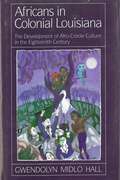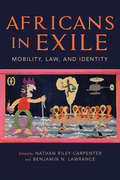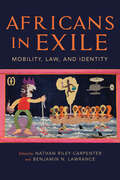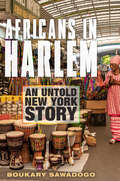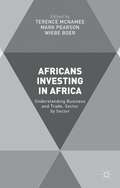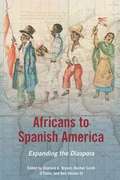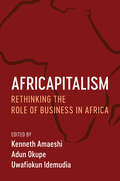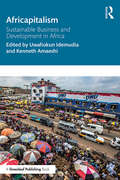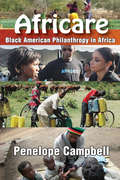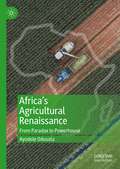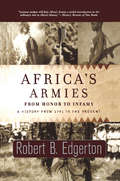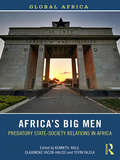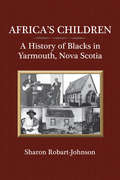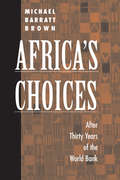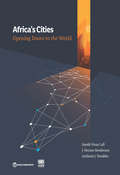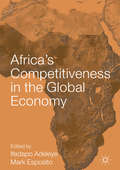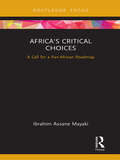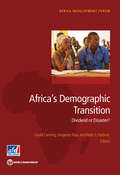- Table View
- List View
Africans and the Holocaust: Perceptions and Responses of Colonized and Sovereign Peoples (Routledge Studies in the Modern History of Africa)
by Edward KissiThis book is an original and comparative study of reactions in West and East Africa to the persecution and attempted annihilation of Jews in Europe and in former German colonies in sub-Saharan Africa during the Second World War.An intellectual and diplomatic history of World War II and the Holocaust, Africans and the Holocaust looks at the period from the perspectives of the colonized subjects of the Gold Coast, Nigeria, Sierra Leone, Kenya, Tanganyika, and Uganda, as well as the sovereign peoples of Liberia and Ethiopia, who wrestled with the social and moral questions that the war and the Holocaust raised. The five main chapters of the book explore the pre-Holocaust history of relations between Jews and Africans in West and East Africa, perceptions of Nazism in both regions, opinions of World War II, interpretations of the Holocaust, and responses of the colonized and sovereign peoples of West and East African to efforts by Great Britain to resettle certain categories of Jewish refugees from Europe in the two regions before and during the Holocaust.This book will be of use to students and scholars of African history, Holocaust and Jewish studies, and international or global history.
Africans Are Not Black: The case for conceptual liberation (Interdisciplinary Research Series in Ethnic, Gender and Class Relations)
by Kwesi TsriAfricans are not literally black, yet they are called black. Why? This book explores the genesis and evolution of the description of Africans as black, the consequences of this practice, and how it contributes to the denigration (blackening) and dehumanisation of Africans. It uses this analysis to advance a case for abandoning the use of the term ‘black’ to describe and categorise Africans. Mainstream discussions of the history of European racism have generally neglected the role of black and white colour symbolisms in sustaining the supposed superiority of those labelled white over those labelled black. This work redresses that neglect, by tracing the genesis of the conception of Africans as black in ancient Greece and its continued employment in early Christian writings, followed by an original, close analysis of how this use is replicated in three key representative texts: Shakespeare's Othello, the translation of the Bible into the African language Ewe, and a book by the influential Ghanaian religious leader, Mensa Otabil. It concludes by directly addressing the argument that ‘black’ can be turned into a positive concept, demonstrating the failure of this approach to deal with the real problems raised by imposing the term ‘black’ on its human referents.
Africans in Britain
by David KillingrayThis collection of essays looks at the history of African people in Britain mainly over the past 200 years
Africans in Colonial Louisiana: The Development of Afro-Creole Culture in the Eighteenth-Century
by Gwendolyn Midlo HallAlthough a number of important studies of American slavery have explored the formation of slave cultures in the English colonies, no book until now has undertaken a comprehensive assessment of the development of the distinctive Afro-Creole culture of colonial Louisiana. This culture, based upon a separate language community with its own folkloric, musical, religious, and historical traditions, was created by slaves brought directly from Africa to Louisiana before 1731. It still survives as the acknowledged cultural heritage of tens of thousands of people of all races in the southern part of the state. In this pathbreaking work, Gwendolyn Midlo Hall studies Louisiana's creole slave community during the eighteenth century, focusing on the slaves' African origins, the evolution of their own language and culture, and the role they played in the formation of the broader society, economy, and culture of the region. Hall bases her study on research in a wide range of archival sources in Louisiana, France, and Spain and employs several disciplines--history, anthropology, linguistics, and folklore--in her analysis. Among the topics she considers are the French slave trade from Africa to Louisiana, the ethnic origins of the slaves, and relations between African slaves and native Indians. She gives special consideration to race mixture between Africans, Indians, and whites; to the role of slaves in the Natchez Uprising of 1729; to slave unrest and conspiracies, including the Pointe Coupee conspiracies of 1791 and 1795; and to the development of communities of runaway slaves in the cypress swamps around New Orleans.
Africans in Exile: Mobility, Law, and Identity (Framing the Global)
by Nathan Riley Carpenter Benjamin N LawranceThe enforced removal of individuals has long been a political tool used by African states to create generations of asylum seekers, refugees, and fugitives. Historians often present such political exile as a potentially transformative experience for resilient individuals, but this reading singles the exile out as having an exceptional experience. This collection seeks to broaden that understanding within the global political landscape by considering the complexity of the experience of exile and the lasting effects it has had on African peoples. The works collected in this volume seek to recover the diversity of exile experiences across the continent. This corpus of testimonials and documents is presented as an "archive" that provides evidence of a larger, shared experience of persecution and violence. This consideration reads exiles from African colonies and nations as active participants within, rather than simply as victims of, the larger global diaspora. In this way, exile is understood as a way of asserting political dissidence and anti-imperial strategies. Broken into three distinct parts, the volume considers legal issues, geography as a strategy of anticolonial resistance, and memory and performative understandings of exile. The experiences of political exile are presented as fundamental to an understanding of colonial and postcolonial oppression and the history of state power in Africa.
Africans in Exile: Mobility, Law, and Identity (Framing the Global)
by Edited by Nathan Riley Carpenter and Benjamin N. Lawrance“This rich volume will interest scholars and students of Africa, the African diaspora, world history, legal history, and international affairs.” —Lorelle Semley, author of To Be Free and French: Citizenship in France’s Atlantic EmpireThe enforced removal of individuals has long been a political tool used by African states to create generations of asylum seekers, refugees, and fugitives. Historians often present such political exile as a potentially transformative experience for resilient individuals, but this reading singles the exile out as having an exceptional experience. This collection seeks to broaden that understanding within the global political landscape by considering the complexity of the experience of exile and the lasting effects it has had on African peoples.The works collected in this volume seek to recover the diversity of exile experiences across the continent. This corpus of testimonials and documents is presented as an “archive” that provides evidence of a larger, shared experience of persecution and violence. This consideration reads exiles from African colonies and nations as active participants within, rather than simply as victims of, the larger global diaspora. In this way, exile is understood as a way of asserting political dissidence and anti-imperial strategies.Broken into three distinct parts, the volume considers legal issues, geography as a strategy of anticolonial resistance, and memory and performative understandings of exile. The experiences of political exile are presented as fundamental to an understanding of colonial and postcolonial oppression and the history of state power in Africa.
Africans in Harlem: An Untold New York Story
by Boukary SawadogoThe untold story of African-born migrants and their vibrant African influence in Harlem.From the 1920s to the early 1960s, Harlem was the intellectual and cultural center of the Black world. The Harlem Renaissance movement brought together Black writers, artists, and musicians from different backgrounds who helped rethink the place of Black people in American society at a time of segregation and lack of recognition of their civil rights. But where is the story of African immigrants in Harlem’s most recent renaissance? Africans in Harlem examines the intellectual, artistic, and creative exchanges between Africa and New York dating back to the 1910s, a story that has not been fully told until now.From Little Senegal, along 116th Street between Lenox Avenue and Frederick Douglass Boulevard, to the African street vendors on 125th Street, to African stores, restaurants, and businesses throughout the neighborhood, the African presence in Harlem has never been more active and visible than it is today. In Africans in Harlem, author, scholar, writer, and filmmaker Boukary Sawadogo explores Harlem’s African presence and influence from his own perspective as an African-born immigrant. Sawadogo captures the experiences, challenges, and problems African émigrés have faced in Harlem since the 1980s, notably work, interaction, diversity, identity, religion, and education. With a keen focus on the history of Africans through the lens of media, theater, the arts, and politics, this historical overview features compelling character-driven narratives and interviews of longtime residents as well as community and religious leaders.A blend of self-examination as an immigrant member in Harlem and research on diasporic community building in New York City, Africans in Harlem reveals how African immigrants have transformed Harlem economically and culturally as they too have been transformed. It is also a story about New York City and its self-renewal by the contributions of new human capital, creative energies, dreams nurtured and fulfilled, and good neighbors by drawing parallels between the history of the African presence in Harlem with those of other ethnic immigrants in the most storied neighborhood in America.
Africans in the Americas: A History of the Black Diaspora
by Michael L. Conniff Thomas J. DavisAfricans in America are referred to as Africans in diaspora. This book provides an inclusive survey on the Africans-Americans where the readers understand their contribution on the world we live in today. Michael L. Conniff, and Thomas J. Davis, give a descriptive the day to day life activities of Africans in America, their personality and how they became part of the world history. The text addresses the interest of the readers on the world history; hence the Africans in Diaspora and their outstanding contribution in America.
Africans in the Old South: Mapping Exceptional Lives across the Atlantic World
by Randy J. SparksThe Atlantic slave trade was the largest forced migration in history, yet most of its stories are lost. Randy Sparks examines the few remaining reconstructed experiences of West Africans who lived in the South between 1740 and 1860. Their stories highlight the diversity of struggles that confronted every African who arrived on American shores.
Africans Investing in Africa
by Terence Mcnamee Mark Pearson Wiebe BoerAfricans Investing in Africa explores intra-African trade and investment by showing how, where and why Africans invest across Africa; to identify the economic, political and social experiences that hinder or stimulate investment; and to highlight examples of pan-African investors. This book is the outcome of a project conceived in 2011 by the Johannesburg-based Brenthurst Foundation and the Lago-based Tony Elumelu Foundation. The foundations, drawing on their established record of scholarship and policy advice on issues impacting Africa's economic growth and development, agreed to undertake in-depth, case-study based research into why African-owned or/and African-based companies were still struggling to succeed across multiple geographies on the continent, despite the Africa's impressive economic growth rates and overall improvements in macro-economic management.
Africans to Spanish America: Expanding the Diaspora
by Rachel Sarah O'Toole Ben Vinson Sherwin K. BryantAfricans to Spanish America expands the diaspora framework to include Mexico, Peru, Ecuador, and Cuba, exploring the connections and disjunctures between colonial Latin America and the African diaspora in the Spanish empires. Analysis of the regions of Mexico and the Andes opens up new questions of community formation that incorporated Spanish legal strategies in secular and ecclesiastical institutions as well as articulations of multiple African identities. The volume is arranged around three sub-themes: identity construction in the Americas; the struggle by enslaved and free people to present themselves as civilized, Christian, and resistant to slavery; and issues of cultural exclusion and inclusion. Contributors are Joan Cameron Bristol, Nancy E. van Deusen, Leo Garafalo, Herbert S. Klein, Charles Beatty Medina, Karen Y. Morrison, Rachel Sarah O'Toole, Frank "Trey" Proctor, and Michele B. Reid.
Africapitalism: Rethinking The Role Of Business In Africa
by Kenneth Amaeshi Adun Okupe Uwafiokun IdemudiaAfrica is on the rise. Enabled by natural resources, commodity trading and the recent discovery of Africa as the last frontier of capitalism by the global market, African entrepreneurs are now being empowered as economic change agents. How can this new economic elite engage in the sustainable development of the continent? 'Africapitalism', the term coined by Nigerian economist Tony O. Elumelu, describes an economic philosophy embodying the private sector's commitment to the economic transformation of Africa through investments generating economic prosperity and social wealth. The concept has attracted significant attention in both business and policy circles. Promoting a positive change in approach and outlook towards development in Africa, this book consolidates research and insights into the Africapitalism movement, and will appeal to scholars, researchers and graduate students of Africa studies, international business, business and society, corporate social responsibility, strategic management, economic thought, international political economy, leadership and development studies.
Africapitalism: Sustainable Business and Development in Africa
by Uwafiokun Idemudia Kenneth AmaeshiUsing theory, empirical research, and case studies, this book explores the changing nature of business in Africa and how businesses can actively contribute to the development of Africa. It uses (and critically analyses) the concept of Africapitalism – a management philosophy and movement which seeks to blend the best of African values and Western management theories as a basis for sustainable development in Africa – to understand the subtle factors that underpin business decisions in Africa. The collection of chapters in this book are organized around actors, issues, and reflections. They collectively present an account of Africapitalism, albeit from different perspectives and on different issues, and open up a new space for rethinking business and society relations in Africa from an Africapitalism perspective. Crucial is the critical engagement with both the discourse and practice of Africapitalism and its implications for sustainable development. It is anticipated that the challenges and opportunities highlighted by the book would be embraced by researchers, policy makers, and practitioners in the broad area of business and society in Africa. This multidisciplinary book will be valuable reading for advanced students, researchers and policymakers looking at business in society; corporate social responsibility; sustainable business; international business and African development.
Africare: Black American Philanthropy in Africa
by Penelope CampbellAfricare is a US-based non-profit organization specializing in development aid for Africa. It is also the oldest and largest African-American led organization in the development field. Since its founding in 1970, Africare has delivered more than $710 million in assistance through over 2,500 projects to thirty-six African countries. The organization employs over 1,000 people, largely indigenous to the countries affected.This is a study in leadership and competing African and American black interests. Africare has sought to become the leading voice speaking on Africa within the US, a goal more difficult to attain than becoming the premier NGO in Africa. Sources of opinion and channels of expression about American policy in Africa are fragmented. They do not have name recognition or influential sponsors. There is poor coverage of African affairs in the US, except for key, often tragic, events. Africare has a heritage and has filled a niche in American society. Penelope Campbell argues that unless the organization reclaims these unique assets, it may lose the distinctiveness enabling its survival.The challenge for Africare is spreading its story and message. The author raises disturbing fundamental issues. Has foreign aid become such an industry that the patient is not allowed to get well? As the military cannot afford peace, it seems the world cannot afford the cessation of poverty. Campbell argues that success in Africa has been elusive not because of the failures of development organizations, but the magnitude of the issues involved. The author presents a convincing case for aid to Africa, the pitfalls involved, and for Africare's potential as a leader in meeting the continent's needs.
Africa’s Agricultural Renaissance
by Ayodele OdusolaThis book addresses the paradox between preponderance of hunger in a continent that is well endowed with fertile agricultural land, plenty of fresh water and a vibrant labor force. As some statistics show, close to 60% of arable land in the world is located in Africa which also has several rivers flowing in all seasons and plenty of underground water. The bulk of its labor force thrives on agriculture, yet the continent’s largest import item is food. 23 of 36 the most malnourished countries also belong in Africa. This has caused significant needless human suffering. <P><P> This book goes beyond providing the traditional framework of supplying policy recommendations to delivering an applied, innovative framework upon which policymakers, the private sector and international institutions can take clear and deliberate action to stimulate Africa's agricultural sector, thus responding to the 2030 Agenda for Sustainable Development.
Africa's Agricultural Renaissance: From Paradox to Powerhouse
by Ayodele OdusolaThis book addresses the paradox between preponderance of hunger in a continent that is well endowed with fertile agricultural land, plenty of fresh water and a vibrant labor force. As some statistics show, close to 60% of arable land in the world is located in Africa which also has several rivers flowing in all seasons and plenty of underground water. The bulk of its labor force thrives on agriculture, yet the continent’s largest import item is food. 23 of 36 the most malnourished countries also belong in Africa. This has caused significant needless human suffering. This book goes beyond providing the traditional framework of supplying policy recommendations to delivering an applied, innovative framework upon which policymakers, the private sector and international institutions can take clear and deliberate action to stimulate Africa's agricultural sector, thus responding to the 2030 Agenda for Sustainable Development.
Africa's Armies: From Honor to Infamy a History from 1791 to the Present
by Robert B. EdgertonAfrica’s Armies traces the military history of sub-Saharan Africa from the pre-colonial era to the present. Robert Edgerton begins this sweeping chronicle by describing the role of African armies in pre-colonial times, when armed forces or militias were essential to the maintenance and prosperity of their societies. During the colonial era, African soldiers fought with death-defying courage, earning such respect as warriors that they were often recruited into the colonial armies not simply to enforce colonial rule in Africa, but to fight for the European homelands as well. After independence swept through Africa, African military men seized political power in country after country, ruling dictatorially for their own benefit and for that of their kinsmen and cronies. The author describes the post-colonial civil wars that have devastated much of sub-Saharan Africa – catastrophes marked by genocide, famine, disease, economic collapse, and steadily declining life expectancy. He closes by describing the role that Africa’s military forces can and must play if the future is to bring better times to the continent’s many peoples.
Africa’s Big Men: Predatory State-Society Relations in Africa (Global Africa)
by Kenneth Kalu Olajumoke Yacob-Haliso Toyin FalolaThis book spotlights, analyzes and explains varying forms and patterns of state-society relations on the African continent, taking as point of departure the complexities created by the emergence, proliferation and complicated interactions of so-called ‘big men’ across Africa's fifty-four states. The contributors interrogate the evolution of Africa’s big men; the role of the big men in Africa’s political and economic development; and the relationship between the state, the big men and the citizens. Throughout the chapters the contributors engage with a number of questions from?different disciplinary and methodological orientations. How did these states evolve to exhibit various deformities in their composition, functioning and in their relations with the societies that they govern? What roles did Atlantic and other slavery and European colonialism play in creating states that are unable to display the right and good relationships with citizens in civil society? Why did these forms of predatory state-society relations continue to thrive in Africa after the end of Atlantic slave trade and subsequent colonialism? Why did the emerging African leaders at independence fail to effectively dismantle the structures of exploitation and expropriation that were the defining features of slavery and colonialism? Who are Africa’s ‘big men’, and what are their trajectories? This book is essential reading for all students and scholars of African politics, public policy and administration, political economy, and democratisation.
Africa's Children: A History of Blacks in Yarmouth, Nova Scotia
by Sharon Robart-Johnson"Africa’s Children is a testament to one’s heritage, a belief in one’s ancestors, and a record of truth … no told!" – Dr. Henry V. Bishop, chief curator, Black Cultural Centre, Dartmouth, Nova Scotia Chronicling the history of Black families of the Yarmouth area of Nova Scotia, Africa’s Children is a mirror image of the hopes and despairs and the achievements and injustices that mark the early stories of many African-Canadians. This extensively researched history traces the lives of those people, still enslaved at the time, who arrived with the influx of Black Loyalists and landed in Shelburne in 1783, as well as those who had come with their masters as early as 1767. Their migration to a new home did little to improve their overall living conditions, a situation that would persist for many years throughout Yarmouth County. By drawing on a comprehensive range of sources that include census and cemetery records, church and school histories, libraries, museums, oral histories, newspapers, wills, The Black Loyalist Directory, and many others, this is a history that has been overlooked for far too long.
Africa's Choices: After Thirty Years Of The World Bank
by Michael Barratt BrownThis book provides an account of actual African experience and African criticisms. It is designed to examine the actual viability of the World Bank's structural adjustment strategies for Africa, all of which were designed to encourage export-led growth.
Africa's Cities: Opening Doors to the World
by Anthony J. Venables J. Vernon Henderson Somik Vinay LallCities in Sub-Saharan Africa are experiencing rapid population growth. Yet their economic growth has not kept pace. Why? One factor might be low capital investment, due in part to Africa’s relative poverty: Other regions have reached similar stages of urbanization at higher per capita GDP. This study, however, identifies a deeper reason: African cities are closed to the world. Compared with other developing cities, cities in Africa produce few goods and services for trade on regional and international markets To grow economically as they are growing in size, Africa’s cities must open their doors to the world. They need to specialize in manufacturing, along with other regionally and globally tradable goods and services. And to attract global investment in tradables production, cities must develop scale economies, which are associated with successful urban economic development in other regions. Such scale economies can arise in Africa, and they will—if city and country leaders make concerted efforts to bring agglomeration effects to urban areas. Today, potential urban investors and entrepreneurs look at Africa and see crowded, disconnected, and costly cities. Such cities inspire low expectations for the scale of urban production and for returns on invested capital. How can these cities become economically dense—not merely crowded? How can they acquire efficient connections? And how can they draw firms and skilled workers with a more affordable, livable urban environment? From a policy standpoint, the answer must be to address the structural problems affecting African cities. Foremost among these problems are institutional and regulatory constraints that misallocate land and labor, fragment physical development, and limit productivity. As long as African cities lack functioning land markets and regulations and early, coordinated infrastructure investments, they will remain local cities: closed to regional and global markets, trapped into producing only locally traded goods and services, and limited in their economic growth.
Africa’s Competitiveness in the Global Economy (Aib Sub-saharan Africa (ssa) Ser.)
by Ifedapo Adeleye Mark EspositoThis book highlights the key issues, opportunities and challenges facing African firms, industries, cities and nations in their quest to compete successfully in the global economy. Exploring a topic which has grown in importance as Africa faces a period of subdued economic development, this edited collection takes a unique multi-disciplinary, multi-industry and multi-country approach. The authors provide insights into a broad range of issues, including competitiveness measurement and evaluation, sectoral competitiveness of declining and emerging industries, threats of the 'Dutch Disease,' and talent competitiveness. This timely book offers a response to the urgent need for the diversification of economies and the advancement of manufacturing in Africa, appealing to scholars of international business and economics.
Africa's Critical Choices: A Call for a Pan-African Roadmap (Europa Regional Perspectives)
by Dunod EditeurThis volume examines contemporary Africa, a vast continent which, while entering the era of globalization, is also confronted by a number of issues, including the environment and climate change, demographics, trade issues, internal and external migration, education, economic Issues, governance, and the influence of other countries. Written by former Prime Minister of Niger and current Chief Executive Officer of the Secretariat of the New Partnership for Africa’s Development (NEPAD), Dr Ibrahim Assane Mayaki, this book offers an overview of Africa, and looks to the next generation of leaders in the continent, aiming to offer a manifesto for future change.
Africa's Demographic Transition
by Abdo S. Yazbeck David Canning Sangeeta RajaAfrica is poised on the edge of a potential takeoff to sustained economic growth. This takeoff can be abetted by a demographic dividend from the changes in population age structure. Declines in child mortality, followed by declines in fertility, produce a 'bulge' generation and a large number of working age people, giving a boost to the economy. In the short run lower fertility leads to lower youth dependency rates and greater female labor force participation outside the home. Smaller family sizes also mean more resources to invest in the health and education per child boosting worker productivity. In the long run increased life spans from health improvements mean that this large, high-earning cohort will also want to save for retirement, creating higher savings and investments, leading to further productivity gains. Two things are required for the demographic dividend to generate an African economic takeoff. The first is to speed up the fertility decline that is currently slow or stalled in many countries. The second is economic policies that take advantage of the opportunity offered by demography. While demographic change can produce more, and high quality, workers, this potential workforce needs to be productively employed if Africa is to reap the dividend. However, once underway, the relationship between demographic change and human development works in both directions, creating a virtuous cycle that can accelerate fertility decline, social development, and economic growth. Empirical evidence points to three key factors for speeding the fertility transition: child health, female education, and women's empowerment, particularly through access to family planning. Harnessing the dividend requires job creation for the large youth cohorts entering working age, and encouraging foreign investment until domestic savings and investment increase. The appropriate mix of policies in each country depends on their stage of the demographic transition.
Africa's Development in Historical Perspective
by Emmanuel Akyeampong Robert H. Bates Nathan Nunn James A. Robinson Emmanuel Akyeampong Robert H. Bates Nathan NunnThis edited volume addresses the root causes of Africa's persistent poverty through an investigation of its longue durée history. It interrogates the African past through disease and demography, institutions and governance, African economies and the impact of the export slave trade, colonialism, Africa in the world economy, and culture's influence on accumulation and investment. Several of the chapters take a comparative perspective, placing Africa's developments aside other global patterns. The readership for this book spans from the informed lay reader with an interest in Africa, academics and undergraduate and graduate students, policy makers, and those in the development world.
